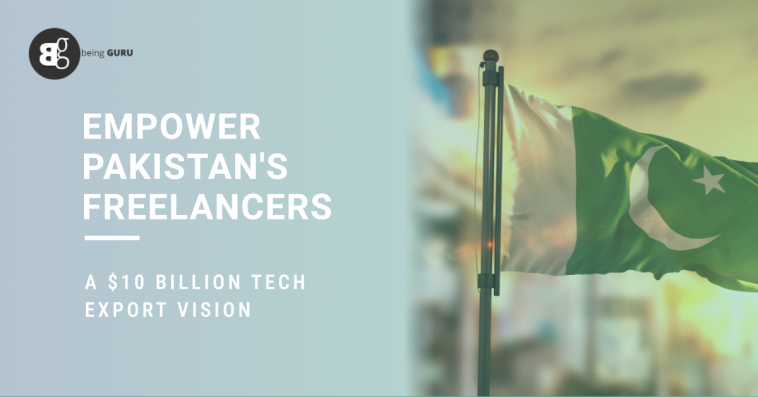In a remarkable endeavor to transform Pakistan into a thriving tech export hub, Dr. Umar Saif, the Caretaker Federal IT and Telecommunication Minister, is spearheading an ambitious plan aimed at generating a substantial $10 billion in annual tech exports. This groundbreaking strategy revolves around empowering one million freelancers to earn a daily income of $30, with the government providing essential funding and co-working spaces, all to be accomplished within the next two to three months.
Embracing Freelancers for Economic Transformation
The mission is clear: empower freelancers as key contributors to Pakistan’s economic growth. With a growing number of freelancers eager to showcase their skills and talents on the global stage, Pakistan stands on the cusp of a transformative journey. The vision is grand, with the government focusing on enabling freelancers to earn a substantial income while contributing to the nation’s economy.
You may want to read: Freelancer Digital Account Framework Unveiled by SBP
A Digital Revolution: PayPal’s Impending Entry
One of the most significant steps in this transformation is Pakistan’s ongoing negotiation with PayPal, the renowned digital payment platform. The nation anticipates a positive response within approximately one month, which would seamlessly connect PayPal with Pakistan’s banking system. This connection would streamline export proceeds for IT professionals and others, making it easier for freelancers to receive their hard-earned income.
You may want to read: Freelancers in Pakistan to Benefit from Apple Pay and Google Pay Integration via Sadapay
Fast-Tracking to 5G
Furthermore, the interim government is determined to launch advanced mobile internet 5G within the next eight months, potentially by June-July 2024. Dedicated government officials are diligently working on this project and anticipate finalizing preparations for the 5G auction process, which will be continued by the newly elected government.
The P@SHA-HBL Partnership
The recent announcements made by Dr. Saif were unveiled during an event at Habib Bank Limited (HBL), where a memorandum of understanding (MoU) was signed between HBL and the Pakistan Software Houses Association (P@SHA). This multi-year partnership is entirely focused on positioning Pakistan as a global tech destination, recognizing the IT industry as a key driver of economic growth and job creation.
The Pakistan Startup Fund: A Boost to Innovation
Dr. Saif revealed that the government has allocated nearly Rs2 billion to establish the Pakistan Startup Fund. This fund is set to boost innovation and entrepreneurship in the country, with venture capitalists contributing an additional Rs8 billion through Series ‘A’ financing. There will be co-working spaces built to house some 500,000 independent IT contractors.
Bridging the Earnings Gap
Pakistan now exports IT goods for about $2.5 billion a year, but the real amount may be closer to $3.5–4.5 billion. With recent government initiatives allowing IT experts and independent contractors to keep up to 50% of their revenues in foreign currency accounts within Pakistan instead of the prior cap of 35%, it is anticipated that this disparity will close.
Facilitating Venture Capital Investment
Dr. Saif explained, “If a venture capital firm engages with the Pakistan Startup Fund (PSF), they would only need to invest $800,000 (80% of the total project cost), while the remaining $200,000 in grant equity-free funding would be provided by the government through PSF. For venture deals, this arrangement permits a 20% risk underwriting or possible upside.” He underlined that a number of foreign and local funds have already committed investments, demonstrating the expanding presence of venture capital in Pakistan.
Co-Working Spaces: A Haven for Freelancers
Dr. Saif pointed out that Pakistan has 1.5 million freelancers who have received government training over the years. However, many of them lack the resources to purchase a computer worth Rs300,000 or establish their own offices. To address this issue, the government plans to create private-sector co-working spaces, requiring a substantial Rs50 billion investment, to accommodate half a million freelancers. The IT minister reaffirmed that the necessary funds have already been allocated for this endeavor.
A Transformative Vision
According to “Dr. Saif, there are currently 500,000 independent contractors working in the commercial sector and an additional 500,000 in the public sector, with each one making $30 per day. Though it’s an ambitious objective, let’s say $30 each day. That comes to $10 billion annually or one-third of Pakistan’s $30 billion worth of total yearly exports.”
The State Bank of Pakistan’s Perspective
Saleem Ullah, the deputy governor of the State Bank of Pakistan (SBP), highlighted that the nation’s IT advancements had the potential to revolutionize economic growth. He emphasized how important the IT sector is to improving Pakistan’s balance of payments and urged IT companies to lower the amount of IT items they import in order to lower the import bill.
Conclusion
The ambitious vision of Dr. Umar Saif and the Pakistani government to empower freelancers and transform Pakistan into a tech export hub is not only groundbreaking but also promising for the country’s economic growth and global presence.
FAQs
1. How will the government support freelancers in achieving the $10 billion export goal?
The government plans to provide funding and co-working spaces to one million freelancers to enable them to earn $30 daily.
2. What is the significance of PayPal’s potential entry into Pakistan?
PayPal’s entry would streamline export proceeds for IT professionals and freelancers, making it easier to receive payments from international clients.
3. How does the Pakistan Startup Fund contribute to innovation and entrepreneurship?
The Pakistan Startup Fund allocates funds to boost innovation by collaborating with venture capitalists and creating co-working spaces for IT freelancers.
4. What steps are being taken to narrow the earnings gap in Pakistan’s IT exports?
The government has increased the limit for IT professionals and freelancers to retain a higher percentage of their earnings in foreign currency accounts within Pakistan.
5. What role does the State Bank of Pakistan play in the IT sector’s growth?
The State Bank of Pakistan recognizes the IT sector’s potential to boost economic growth and encourages IT companies to reduce their imports to benefit the country’s balance of payments.





